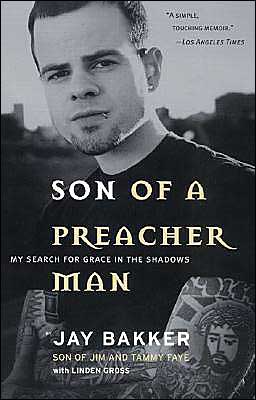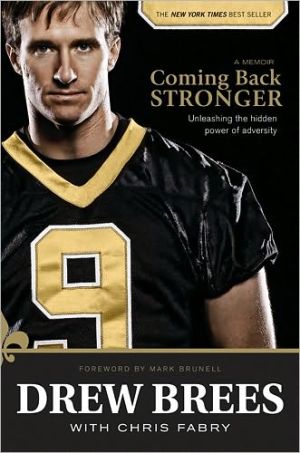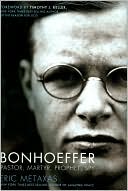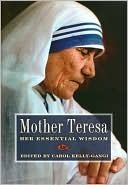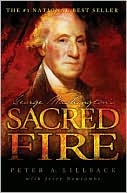Son of a Preacher Man: My Search for Grace in the Shadows
In Son of a Preacher Man Jay Bakker, son of famous televangelists Jim and Tammy Faye Bakker, tells the compelling story of growing up in the glaring lights of a television studio. It's all here: the Bakker family's public disgrace, the fall of the PTL (Praise The Lord) media empire, and Bakker's subsequent plunge into a morass of anxiety and selfdestruction. But Son of a Preacher Man is more than a tell-all — it is a story that dramatizes the human toll of this tragedy on the Bakker family,...
Search in google:
When Jim Bakker was convicted in 1989 of defrauding followers of his PTL (Praise The Lord) ministry of $158 million, Jay Bakker lost everything. With his father in prison, his family shattered by divorce, and his name forever linked to a national scandal, Jay's already bizarre life came completely unglued. Here is the story—a parable of striking import—of a young boy whose life was almost destroyed by televangelist excess and greed.In his new street ministry, Revolution, Jay has found a unique way of preaching the gospel that is tailored to those most like him, the tattooed and pierced youth of downtown Atlanta. By advocating God's love for everyone, regardless of past sins, Jay found his path back to the faith—and picked up a large and growing following along the way. This is a hard-hitting account of finding grace in the shadows of the Right, where men like Jerry Falwell and Oral Roberts turned their backs on the Bakkers even while advocating forgiveness and redemption.About the Authors:Jay Bakker, 25, has been featured in several recent articles, including an acclaimed Rolling Stone feature, USA Today, and numerous other publications. He lives with his wife, Amanda, in Atlanta, where he leads Bible classes in his basement, and ministers to youth who live on the street. Linden Gross lives in San Francisco, CA. Arizona Daily Star ...personal histories...are best read by the people who lived them.Jay Bakker...conveys an intensity that would be difficult to fake.
Chapter One\ The Keys to the Kingdom\ If anyone had an excuse to lose faith in God, it would've been me. Id been beaten up so often by traditional religion that turning away from God, as so many others my age did, would have been the most natural reaction.\ I started life on Christian television. You would think that, based on my family, some of the most influential Christians in the world, I would have led an exemplary life. As it turns out, I wasn't so different from other pastors' kids, who are notoriously rebellious. After all, we have pretty high expectations to rebel against.\ The gospel my father preached and my mother stood for is often flattened out by others to one of material riches. I hate that. My parents' real message was always about prosperity of the soul: charity, love, forgiveness, and respect for, others. Unlike so many other ministers, they believed that only God had the right to judge. But I lived life in the shadows of that ideal.\ Yes, my family did things wrong. And so did I. It would be a long time before we would get back to the light. In the shadows where we walked, I would see many dark things and meet many dark people. Along, with my family, I experienced the dark side of a Christian message that no one should ever have to endure. I lived through the dark side of my parents' marriage, which ultimately did not stand the test of time or hardship. And I dove headlong into the dark side of myself.\ Considering how my life began twenty-five years ago, on December 18, 1975, that's a far cry from how things were supposedto play out. The doctors had told my parents that my mother would be in labor with me for at least eighteen hours. So my dad, per my mom's wishes, went ahead as usual with his TV ministry show. But when the doctor was forced to perform a cesarean and cut me right out of my mom's belly, Dad was still on camera. As soon as the program directors got word that I'd been born, they flashed "It's a boy! It's a boy! It's a boy!" across the screen. I think the TV audience knew I'd arrived before my dad did.\ Having millions of television viewers share my life would be the norm for me for the next eleven years, for I was basically born into the premier family of a megamedia church. I was required to appear on TV with my parents every Sunday for church services, every holiday, and anywhere from twice a month to five times a week on top of that.\ It was an amazing time in Christian America. My father was at the forefront of a group of men and women who forever changed how Christ's message was received. He, like Oral Roberts, Robert Schuller, and Billy Graham, among others, found a way to broadcast sermons to millions from coast to coast. And in the process, people began to look to him for guidance. In short, our lives revolved around my parents' television ministry, called PTL, which stood for "Praise the Lord."\ I guess we were supposed to be the perfect Christian family. But even though my parents openly discussed some of our problems on camera, things weren't really what you'd think.\ PTL was my father's dream, one he worked hard for. My mother and father's ministry had come a long way from handmade puppet performances on Pat Robertson's fledgling Christian Broadcasting Network, their life a long way from hanging their own wallpaper in a one-bedroom third-floor walk-up rental apartment.\ My parents weren't born into the abundance I was. My mom grew up poor in rural International Falls, Minnesota, with a mother who was ostracized because she had divorced, a loving stepfather who worked at the local paper mill, and seven younger brothers and sisters she had to help care for.\ They kept their clothes clean with a wringer washing machine, depended on an icebox instead of a refrigerator, and, despite twenty- or thirty-below-zero winter temperatures, had to use an outhouse instead of an indoor bathroom.\ My dad's family had a little more money, but not much.\ My parents met in North Central Bible College in Minnesota, where they were both studying for the ministry. They married soon after, on April 1, 1961, left school, and became itinerant evangelists. Mom played the accordion and sang, and Dad preached. During Sunday school, they would perform a puppet show for children: Mom provided the voices and action for Suzy Moppett and Allie the Alligator, while Dad stood out front and talked to the puppets.\ In 1966, that show landed them on Pat Robertson's new TV network. The audience loved them, and what was supposed to be a one-time appearance became a regular feature. The puppet show's success also led to Dad's hosting a Christian TV show called the 700 Club, which he had modeled after Johnny Carson's Tonight Show. The talk show proved an instant hit, and the station's viewership and donations soared. Since the new television ministry didn't sell advertising, its existence was completely dependent on donations. And with this new format, TV religion began to sweep across the nation and eventually around the world.\ After eight years, Mom and Dad moved away from Pat Robertson. After helping found TBN (Trinity Broadcasting Network), they launched PTL. Their show was so popular in Charlotte, North Carolina, where they'd moved, that Dad decided to buy time on some fifty stations -- one station at a time -- across the country to see how it would do nationally. The overwhelming success that washed over them seemed heaven-sent.\ \|\|Son of a Preacher Man. Copyright © by Jay Bakker. Reprinted by permission of HarperCollins Publishers, Inc. All rights reserved. Available now wherever books are sold.\|
AcknowledgmentsxiIntroductionxviiPart 1Eden1.The Keys to the Kingdom32.Shadows133.Betrayed314.Trial and Tribulation49Part 2The Fall5.Low-Level Searching656.Alone in the Dark817.From Heritage to Hell958.The Prodigal Son103Part 3Redemption9.The Seeds of Salvation11510.Praying on the Outside12911.Lost and Found14512.Restoration15713.The Sober Truth167Part 4Carrying the Message14.Sharing the Truth17715.Grace for the Tortured193Index213
\ Arizona Daily Star...personal histories...are best read by the people who lived them.Jay Bakker...conveys an intensity that would be difficult to fake.\ \ \ \ \ Publishers Weekly - Publisher's Weekly\ From the opening epigram (a passage from Romans about learning from trials and adversities) to the rousing concluding chapter, this memoir by the son of the scandal-ridden televangelists Jim and Tammy Faye Bakker inspires, captivates and entertains. Even before his dad was arrested, Jay confesses, family life began to fall apart: Mom was addicted to drugs, and Jay's 16-year-old sister ran off to marry her beau. And then, in a haze of scandal, his father, whom Jay lionizes, was sentenced in 1989 to 45 years in prison. Jay's portrait of Papa Bakker is extremely sympathetic--at times, a tad too worshipful. He also includes a touching vignette about Jimmy Swaggart, who agreed to help Jay get his father's prison sentence reduced when no other big-name pastors dared to intervene. In the years since his father was released from prison, young Jay Bakker has discovered he's an alcoholic, and gotten sober; fallen in love, and gotten married; and realized he's a sinner, and gotten right with God. He's now a pastor--a tattooed, hip pastor--in Atlanta, ministering to street youth on skateboards. Readers are sure to love Bakker's delightfully down-to-earth, slightly self-mocking tone ("For a while I thought I was Jim Morrison," he says about his acid-tripping, cowboy-boot-sporting days in high school), and will hope he'll somehow carve out time to write more books. (Feb.) Copyright 2001 Cahners Business Information.\ \ \ VOYAHaunted by a traumatic childhood during which his parents rose to become the darlings of Christian television, then crashed, defrocked and hounded by the media, his father jailed, Jay Bakker, son of Jim and Tammy Faye, spent his adolescence searching both for answers to why this had happened to his family and for a reason to keep believing in God. In this autobiographical account of those turbulent years, Jay lays bare the fears and addictions that led to his loss of self. He turned to alcohol as a means of escape from the reality of his family's experience and his father's situation. Jay believed that his father had never done anything criminal, and he could not believe the treatment that Bakker was receiving from the Christian right, most of whom had been his staunchest supporters. Alcohol provided Jay with a temporary reprieve. When partying with his friends, he was able to push away all the anger and fear for a time, and he lost years drowning his uncertainty. What distressed Jay most was his belief that God had abandoned him and that he was unworthy of God's love. Through caring friends and mentors both in and out of the church, Jay's struggles with his faith finally subsided, and he came to understand the healing power of grace. This book will be suited best to public libraries and parochial schools. It will not find a wide readership in the public schools due to its religious themes. Index. Photos. VOYA CODES: 3Q 4P J S A/YA (Readable without serious defects; Broad general YA appeal; Junior High, defined as grades 7 to 9; Senior High, defined as grades 10 to 12; Adult and Young Adult). 2001, HarperSanFrancisco, 218p, $23. Ages 12 to Adult. Reviewer: Leslie Carter\ \ \ \ \ Library JournalTwenty-five-old Jay Bakker, who currently ministers to punk rockers, hippies, and street kids in Atlanta, is the son of Jim and Tammy Faye Bakker, the former TV evangelists. Jay, who has been featured in Rolling Stone magazine and has appeared on Larry King Live, grew up amid material abundance in the Bakkers' multimillion-dollar Christian retreat and playground, Heritage, USA. When he was just 12, his mother "overmedicated" and ended up in the Betty Ford Clinic, his parents' rocky marriage lapsed into infidelity, and news of his father's affair quickly led to the loss of the Heritage, USA, "empire." Tried and convicted of de,frauding followers of $158 million, his father was imprisoned, and Jay's life collapsed before he was 13. Rebellion followed, difficulties at school increased, and alcoholism and drugs took over. Moves to new locations brought cycles of hope amid bouts of drunken and drugged despair. Nonetheless, Jay began to minister to the street kids with whom he identified. With this book, he proclaims a very personal message to outcasts, emphasizing Jesus' unconditional love. Recommended for young adult collections.--George Westerlund, Palmyra, VA Copyright 2001 Cahners Business Information.\ \ \ \ \ Kirkus ReviewsAfter a dissolute adolescence, the son of fallen televangelists Jim and Tammy Faye Bakker finds redemption by preaching to the pierced, the punk, and the tattooed. In this hackneyed account of adolescent sturm und drang, Bakker shows that he has learned well the lessons of self-absorption and public confession practiced in such spectacular fashion by his parents."My parents didn't invent the gospel of prosperity," he offers in their defense. Well, no, but they certainly perfected it, living more like Croesus than Christ. Jay Bakker tells us that it was tough being in the national spotlight ("I guess we were supposed to be the perfect Christian family," he says without irony), tougher yet when the Bakker kingdom crumbled and King Jim went off to jail for preying on his congregation more than he prayed for them. Young Bakker identifies Jerry Falwell as the principal villain in the fall of the elder Bakkers' PTL empire, although Pat Robertson and Jimmy Swaggart also feel the fury of Jay Bakker's tiny literary fists. He refuses to admit his father's guilt: it was just Jim Bakker's lifestyle, you see, not his crimes that prompted a jury to send him away for 45 years (he was out in five). His family in ruins, young Bakker assuaged his sorrows with alcohol and drugs. But when he began having continual acid flashbacks, he found salvation ... in Thorazine. But one day he sees Jesus standing behind him in church. Surely, all will soon be well. Not soon enough. Bakker, who has apparently never met a cliché he didn't forgive, poisons his prose with straws that break camels' backs and people who fight tooth and nail. Eventually, he realizeshis"calling"—notan ignoble one: preachingthe message of grace to disenfranchised youth, whom he emulates in body decoration, language, and behavior. Rebelliously, he observes that churches should have smoking sections and that the Christian Right is too intolerant. Sloppy, self-indulgent—and ultimately pathetic.\ \
